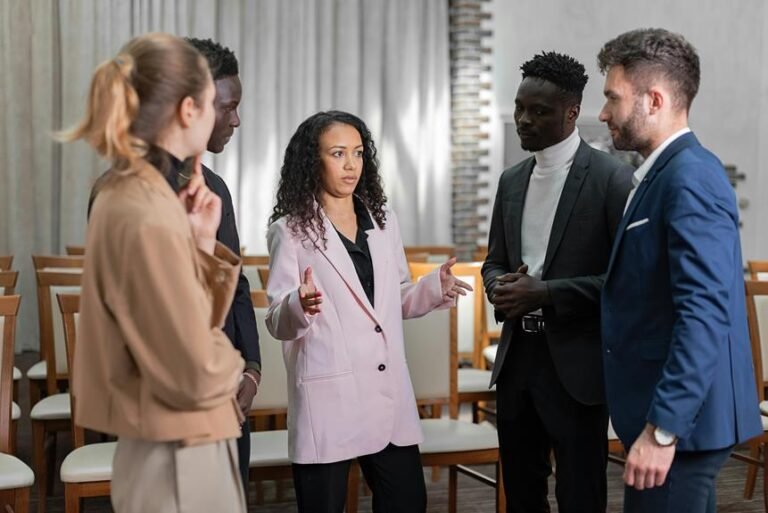Conflict Resolution Strategies for Couples

When disagreements arise in a relationship, knowing how to navigate them effectively can be the key to maintaining a strong and lasting bond with your partner. By implementing proven conflict resolution strategies, you can address issues constructively and find solutions that benefit both of you. But what are these strategies, and how can they be applied in real-life situations to promote understanding and harmony in your relationship?
Key Takeaways
- Practice active listening to truly understand your partner’s perspective.
- Set clear communication boundaries to ensure both feel heard and valued.
- Empathy and validation deepen connection and resolve conflicts effectively.
- Develop conflict resolution skills through role reversal and open communication.
- Prioritize open communication, understanding, and empathy for healthy conflict resolution.
Understanding Root Causes
To resolve conflicts effectively, it’s vital to explore the underlying root causes that often fuel disagreements between partners. Communication breakdowns and trust issues are common culprits that can lead to misunderstandings and conflicts in relationships.
When communication breaks down, it becomes challenging to express thoughts and feelings openly, leading to pent-up frustrations and unmet expectations. Trust, once compromised, can create a ripple effect, causing doubt and insecurity in the relationship.
Understanding these root causes requires a deep level of introspection and empathy towards your partner’s perspective. It’s pivotal to acknowledge the impact of past experiences, personal biases, and emotional triggers that may influence how you communicate and trust.
By addressing these underlying issues, you can begin to rebuild trust and improve communication within your relationship.
Take the time to listen actively, validate your partner’s feelings, and communicate openly and honestly. Building a foundation of trust and improving communication can help prevent future conflicts and strengthen the bond between you and your partner.
Active Listening Techniques
Engaging in active listening methods can significantly enhance your ability to understand and connect with your partner during disagreements.
Reflective listening involves truly hearing and comprehending your partner’s perspective. This approach necessitates focusing on what your partner is saying without interrupting, then restating their words back to them to make sure you’ve grasped correctly.
Nonverbal signals play a substantial role in active listening. Sustaining eye contact, nodding in acknowledgment, and using open body language can demonstrate to your partner that you’re fully present and engaged in the discussion.
Empathetic responses are essential during conflicts. Acknowledge your partner’s feelings and validate them to demonstrate that you comprehend their emotions.
Employing restating techniques can help clarify any misunderstandings that may arise. Recite back what your partner has said in your own words to confirm your comprehension.
Setting Boundaries Together
Establishing clear boundaries together can foster mutual understanding and respect within your relationship, aiding in effective conflict resolution.
Communication boundaries are essential in ensuring that both partners feel heard and valued. It’s vital to establish guidelines on how to communicate respectfully, such as avoiding interrupting each other and using non-blaming language during disagreements.
Respect boundaries involve recognizing each other’s individuality and personal space. It’s important to discuss and agree on how much time alone each partner needs and to respect each other’s emotional boundaries.
Personal space boundaries can include physical boundaries like needing alone time or emotional boundaries like discussing sensitive topics at appropriate times. By setting and respecting these boundaries, you create a safe and supportive environment where conflicts can be addressed constructively.
Practicing Empathy and Validation
Understanding your partner’s feelings and perspectives through empathy and validation is essential for fostering a deeper connection and resolving conflicts effectively.
Emotional support and validation are foundational in creating a safe space where both partners feel heard and understood.
To practice empathy, actively listen to your partner without judgment, focusing on understanding their emotions rather than formulating a response. Pay attention to non-verbal cues like body language and tone of voice, which can provide valuable insights into your partner’s feelings.
Validation is about acknowledging and accepting your partner’s emotions as valid, even if you don’t necessarily agree with their perspective. By validating their feelings, you show empathy and demonstrate your commitment to their emotional well-being.
Remember that validation doesn’t mean you have to give in to their demands; it simply means recognizing the legitimacy of their emotions.
Through empathy practice and understanding cues, you can strengthen your bond and navigate conflicts more constructively.
Developing Conflict Resolution Skills

To effectively navigate conflicts in your relationship, honing your conflict resolution skills is vital for fostering a healthy and harmonious partnership. Developing these skills involves embracing the concept of role reversal and practicing open communication.
When faced with a disagreement, try to put yourself in your partner’s shoes. Imagine how they might be feeling and why they see things the way they do. By understanding their perspective, you can approach the issue with empathy and compassion, paving the way for a more constructive conversation.
Open communication is another essential aspect of honing your conflict resolution skills. Be willing to express your thoughts and feelings openly and honestly, but also remember to listen actively to your partner’s viewpoint. Avoid interrupting or formulating your response while they speak. Instead, focus on truly understanding their words and emotions.
Frequently Asked Questions
How Can Past Traumas Affect Conflict Resolution in Relationships?
Past traumas can greatly impact conflict resolution in relationships. Trust issues stemming from past experiences may lead to a breakdown in communication between partners.
Emotional triggers can intensify conflicts, making it challenging to resolve issues effectively. Developing healthy coping mechanisms and seeking support can help navigate these challenges.
Understanding how past traumas affect your conflict resolution style is vital for fostering a healthier relationship dynamic.
Is It Common for Couples to Have Differing Conflict Resolution Styles?
It’s quite common for couples to have different communication styles when it comes to conflict resolution. Understanding each other’s approach can help bridge this gap.
By acknowledging these differences, you can work together to find compromise techniques that suit both of you. Effective communication and a willingness to adapt can strengthen your relationship and help you navigate conflicts more smoothly.
What Role Does Cultural Background Play in Resolving Conflicts as a Couple?
When considering the role of cultural background in resolving conflicts as a couple, it’s important to acknowledge that communication barriers and interpersonal dynamics can be influenced by diverse cultural norms and values.
While these differences may initially create challenges, they also present opportunities for growth and understanding.
Can Unresolved Conflicts Lead to Long-Term Relationship Damage?
Unresolved conflicts in relationships can indeed lead to long-term damage. When conflicts linger without resolution, trust erosion and communication breakdown can occur, creating emotional distance and straining the relationship.
It’s important to address issues promptly with open communication and a willingness to work through differences together. By actively resolving conflicts, you can prevent these negative consequences and strengthen your bond with your partner.
How Do External Stressors Impact Conflict Resolution Between Partners?
When external stressors impact conflict resolution between partners, emotional triggers may intensify, leading to a breakdown in communication and trust issues.
It’s essential to recognize these triggers and develop healthy coping mechanisms together.
By understanding how stress impacts your relationship dynamics, you can proactively address challenges, strengthen communication, and build trust.
Conclusion
To wrap up, remember that resolving conflicts in relationships requires patience, persistence, and partnership.
By understanding root causes, actively listening, setting boundaries, practicing empathy, and developing conflict resolution skills, you can nurture a more harmonious connection.
Embrace the power of patience and practice, paving the path to peaceful partnership.






